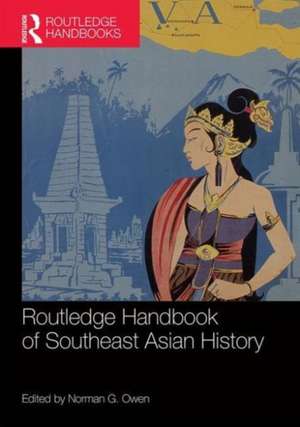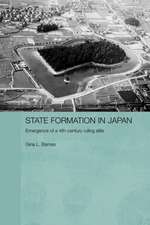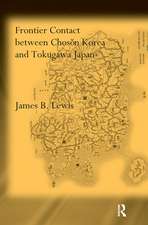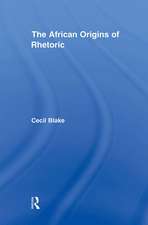Routledge Handbook of Southeast Asian History
Editat de Norman Owenen Limba Engleză Paperback – apr 2016
Contributions by experts in the field are clustered under three major headings - Political History, Economic History, and Social and Cultural History – and chapters challenge the boundaries between topics and regions. Alongside the rise and fall of colonialism, topics include conflict in Southeast Asia, tropical ecology, capitalism and its discontents, the major religions of the region, gender, and ethnicity.
The Handbook provides a stimulating introduction to the most important themes within the subject area, and is an invaluable reference work for any student and researcher on Southeast Asia and Asian and World history.
Preț: 548.26 lei
Preț vechi: 645.00 lei
-15% Nou
Puncte Express: 822
Preț estimativ în valută:
104.91€ • 114.31$ • 88.40£
104.91€ • 114.31$ • 88.40£
Carte tipărită la comandă
Livrare economică 23 aprilie-07 mai
Preluare comenzi: 021 569.72.76
Specificații
ISBN-13: 9781138679214
ISBN-10: 1138679216
Pagini: 376
Ilustrații: 14
Dimensiuni: 174 x 246 x 26 mm
Greutate: 0.68 kg
Ediția:1
Editura: Taylor & Francis
Colecția Routledge
Locul publicării:Oxford, United Kingdom
ISBN-10: 1138679216
Pagini: 376
Ilustrații: 14
Dimensiuni: 174 x 246 x 26 mm
Greutate: 0.68 kg
Ediția:1
Editura: Taylor & Francis
Colecția Routledge
Locul publicării:Oxford, United Kingdom
Public țintă
PostgraduateCuprins
Introduction: in search of Southeast Asian history Part 1: Political History 2. Resources, Rituals, and Realms: the premodern polities 3. The Colonial Intrusion: boundaries and structures 4. Gradations of Colonialism in Southeast Asia’s "In-between" Places 5. Colonizing Minds and Bodies: schooling in colonial Southeast Asia 6. Nationalism and Other Impulses of the Colonial Era 7. Southeast Asia from the Japanese Occupation to Independence 8. Nationalism and Postcolonial Identity in Southeast Asia: defining communities 9. The Cold War in Southeast Asia 10. War and Peace between Nations since 1945 11. Separatism, Civil War, and Genocide: conflicts within nations John Roosa 12. Authoritarianism and Democracy Part 2: Economic history 13. Population Growth and Environmental change: a two-track model 14. Nature, Culture, and the Pre-modern Economy of Southeast Asia 15. Colonial Capitalism and Economic Transformation 16. Migrant Labor and Welfare in Southeast Asia 17. Contemporary Capitalism and the Rise of the "Tigers." 18. Socialism and Underdevelopment in Southeast Asia 19. Globalization and its Discontents in Southeast Asia Part 3: Social and cultural history 20. Islam in Modern Southeast Asian History 21. Modern Buddhism Southeast Asia 22. Christianity in Modern Southeast Asia 23. Gender and Sexuality in Southeast Asian History 24. Finding Women in Southeast Asian history 25. Ethnicity in Precolonial and Colonial Southeast Asia 26. Ethnicity in Postcolonial Southeast Asia 27. Chinese Economic Predominance in Southeast Asia: a long-term perspective 28. Performance in Southeast Asian History 29. Constructing Southeast Asian Pasts: a new retrospective
Notă biografică
Norman G. Owen is an Honorary Professor of the University of Hong Kong. His previous publications include Prosperity without Progress: Manila Hemp and Material Life in the Colonial Philippines (1984) and The Bikol Blend (1999), and he edited The Emergence of Modern Southeast Asia: A New History (2005).
Descriere
The study of the history of Southeast Asia is still growing, evolving, deepening and changing as an academic field. Over the past few decades historians have added nuance to traditional topics such as Islam and nationalism, and created new ones, such as gender, globalization and the politics of memory. Now available in paperback, The Routledge Handbook of Southeast Asian History looks at the major themes that have developed in the study of modern Southeast Asian history since the mid-18th century.













